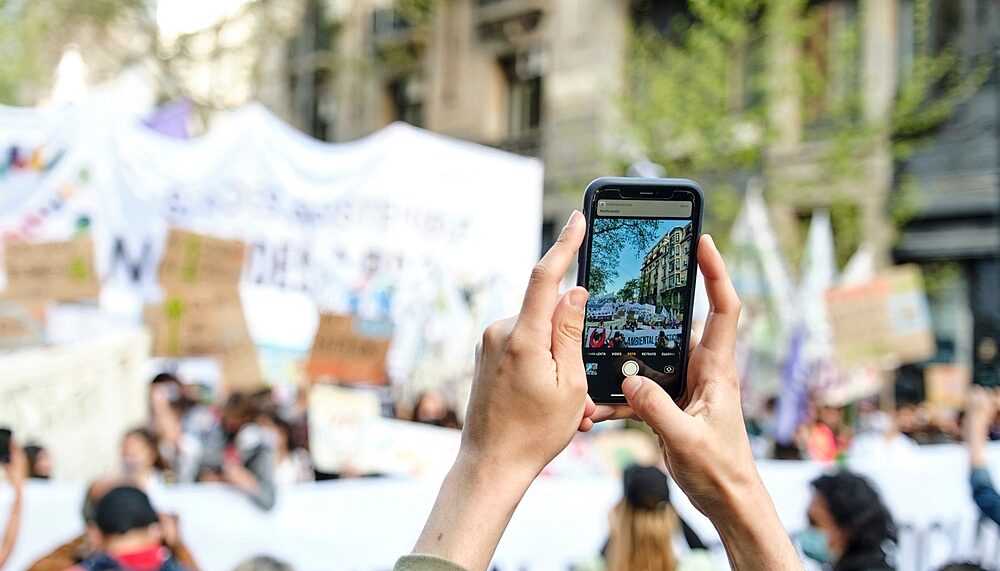BLOG POST | 2 Mar 2023
An intersectional feminist lens on digital peacebuilding
How can technology help foster diversity and equality in peacebuilding?

Digital tools provide benefits and challenges to peacebuilding. An intersectional feminist perspective helps determine how to make the best use of them.
By Nina Strumpf
From activism on social media to the surveillance of minority groups: new technologies impact the field of peacebuilding in profound ways. The digitalisation of our world, accelerated by the COVID-19 pandemic, has huge implications for the transformation of violent conflicts. The theme of International Women’s Day 2023 “DigitALL: Innovation and technology for gender equality” invites us to take seriously a conversation on how digital tools can be implemented in peacebuilding to give agency to communities exposed to discrimination.
Dashed technological hopes?
The hope that digitalisation would promote inclusion and equality has been met by the sobering reality that mechanisms of marginalisation are often reproduced in the digital sphere. While social media can provide a space for LGBTQI+ activists around the world to advocate for decriminalisation and anti-discrimination measures, it can also expose them to violence. In the case of Uganda, a recent study
found that the presence of LGBT+ individuals in online spaces exacerbated their vulnerability to hate crimes. This shows that digital spaces are not necessarily safe, and that they need to be entered carefully.
There are many different understandings of feminism. The lens of intersectional feminism makes power asymmetries and imbalances of power visible and points to multiple and overlapping forms of oppression due to race, income, age, religion, and ability, and other factors. Calls for intersectional feminist analysis were key in civil society engagement with Germany’s feminist foreign and development policy.
The use of social media by female ex-combatants in Columbia provides another example of the possibilities and risks of digital tools. In 2021, a coalition of feminist collectives and indigenous and ethnic minority organisations joined forces with former female combatants from the Revolutionary Armed Forces of Colombia (FARC). Together, they built an online campaign for a gender-inclusive reintegration process into civilian life, called “We Are Movement: Popular Women, Peace and Territory” (Somos Movimiento: Mujeres Populares, Paz y Territorio). While the online space provided an opportunity for these ex-combatants to exercise agency, it also led to increased stigmatisation and exposure to online insults and threats.
Looking beyond technology
To avoid harm, peacebuilders need to carefully consider if and how to use technologies in their work. An intersectional feminist lens offers a holistic view of the challenges to digitalisation in peacebuilding by revealing how it cuts across multiple layers of discrimination based on gender, age, ethnicity and religion, among other factors. A study by the Global Network of Women Peacebuilders reveals how intersectional issues such as poverty, limited infrastructure, persecution, and a lack of educational resources exacerbate restrictions in access to digital technology, particularly in conflict areas. Peace actors need to be aware of these structural barriers and respond with digital tools that are inclusive by design.
The BuildUp collective, for instance, launched a voter education WhatsApp bot in Puntland, Somalia. The bot was designed to offer audio content in addition to text to cater to low literary levels in rural areas, particularly amongst women. This is one example of how peacebuilders can successfully implement digital tools that empower marginalised groups by paying attention to local context and structural constraints.
Furthermore, while the possibility of anonymity makes digital tools more accessible to groups navigating violence and persecution - particularly LGBTQI+ communities - it overlooks the ways in which power structures such as patriarchy and racism are coded into technology. Peacebuilding actors and policymakers need to work closely with experts to expose and dismantle these biases before technology can make a meaningful impact to peacebuilding initiatives. Artificial intelligence built on coded racial and gendered bias and a binary understanding of gender, is just one example.
A way forward
But how can peace practitioners and activists make this a reality? What existing policy frameworks can support this and what new ones need to be developed? The Berghof Foundation and the Plattform Zivile Konfliktbearbeitung (Platform Peaceful Conflict Transformation) are currently conducting a study in cooperation with Build Up to search for answers. The study aims to give guidance on designing and implementing projects using digital tools that successfully contribute to the strategic goal of adding a feminist lens to peacebuilding. It also seeks more concrete answers to what needs to change in existing political frameworks and policies in order for such recommendations to stick.
Media contact
You can reach the press team at:
+49 (0) 177 7052758
email hidden; JavaScript is required


